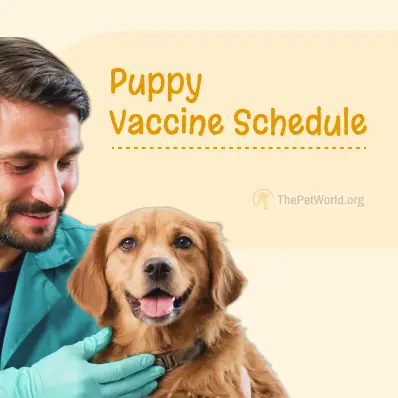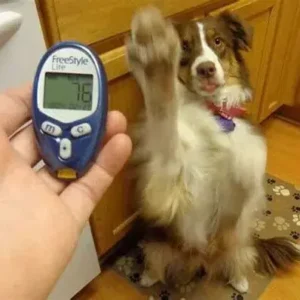Puppy Vaccine Schedule
Here’s a general puppy vaccine schedule chart provided by the American Kennel Club recommended for dogs:
| Age (Weeks/Months) | Core Vaccines | Optional Vaccines |
| 6-8 Weeks | Distemper, Parvovirus | Bordetella |
| 10-12 Weeks | DHPP (Distemper, Adenovirus, Parainfluenza, Parvo) | Influenza, Leptospirosis, Bordetella, Lyme Disease |
| 16-18 Weeks | DHPP, Rabies | Influenza, Lyme Disease, Leptospirosis, Bordetella |
| 12-16 Months | DHPP, Rabies | Coronavirus, Leptospirosis, Bordetella, Lyme Disease |
| Every 1-2 Years | DHPP | Influenza, Coronavirus, Leptospirosis, Bordetella, Lyme |
| Every 1-3 Years | Rabies (as required by law) |
What Are Core Vaccines Vs. Noncore Vaccines?
Core vaccines are universally recommended for all puppies due to their effectiveness against widespread and severe diseases.
On the other hand, non-core vaccines are optional and depend on factors like your pup’s lifestyle, location, and potential exposure risks.
Core vaccines typically include shots against common threats like Distemper, Parvovirus, and Rabies. Noncore vaccines, such as those for Lyme Disease or Bordetella, may be recommended based on your pup’s specific circumstances.
Here’s a quick look at what the non-core and core vaccines include:
| Core Vaccines | Noncore Vaccines |
| Canine Distemper/Adenovirus-2/Parvovirus/Parainfluenza (DA2PP/DHPP/DAPP) | Bordetella bronchiseptica |
| Rabies virus vaccine | Leptospira (Leptospirosis) |
| Borrelia burgdorferi (Lyme) | |
| H3N2/H3N8 (Canine Influenza) vaccines | |
| Crotalux atrox (Rattlesnake) vaccine |
Which Shots Are Essential For Puppies?
Here’s a breakdown of each disease your puppy needs a shot for:
Bordetella Bronchiseptica (Kennel Cough)
Kennel cough is a highly contagious respiratory disease in dogs, characterized by a persistent, dry cough. It spreads in places where dogs are in close proximity, such as kennels or dog parks.
Protecting against kennel cough, the Bordetella Bronchiseptica vaccine guards your pup against a highly contagious respiratory infection. Ideal for social dogs who frequent places like dog parks or boarding facilities.
Canine Distemper
Canine distemper is a viral disease that affects a dog’s respiratory, gastrointestinal, and nervous systems. It can lead to respiratory issues, fever, and neurological symptoms.
Canine distemper is a viral disease affecting various systems. The DA2PP/DHPP/DAPP vaccine is pivotal, preventing severe respiratory, gastrointestinal, and neurological symptoms, ensuring a healthier, happier puppy.
Canine Hepatiti
Canine hepatitis is a viral infection that targets the liver and other organs. Symptoms include fever, lethargy, and abdominal pain. Vaccination is effective in preventing the disease and its potential complications.
The DA2PP/DHPP/DAPP vaccine safeguards against canine hepatitis, a viral infection impacting the liver and organs. It prevents symptoms like fever and abdominal pain, offering comprehensive protection.
Canine Parainfluenza Virus
Canine parainfluenza is a highly contagious respiratory virus that contributes to kennel cough. It can cause coughing, nasal discharge, and other respiratory symptoms.
Guarding against respiratory infections, the DA2PP/DHPP/DAPP vaccine is vital. It reduces the risk of coughing and nasal discharge, ensuring your puppy’s respiratory health.
Coronavirus
This coronavirus is not the same as COVID-19. Canine coronavirus primarily affects a dog’s gastrointestinal tract, leading to diarrhea and other digestive issues.
Protecting against canine coronavirus, the Coronavirus vaccine is essential for preventing digestive issues. While not typically life-threatening, it minimizes the severity of symptoms, contributing to your pup’s overall well-being.
Heartworm
Heartworm disease is caused by parasitic worms that affect a dog’s heart, lungs, and blood vessels. It is transmitted through the bite of a mosquito.
Essential for regions with mosquito prevalence, the heartworm vaccine prevents parasitic infestations that can affect a dog’s heart and lungs, ensuring a healthier and more active life.
Leptospirosis
Leptospirosis is a bacterial infection that affects a dog’s liver and kidneys. It can be transmitted through contact with contaminated water or soil.
The Lepto vaccine protects against leptospirosis, a bacterial infection impacting the liver and kidneys. Ideal for dogs exposed to wildlife or water sources, it prevents severe health complications.
Lyme Disease
Lyme disease is a tick-borne illness caused by the bacterium Borrelia burgdorferi. It can lead to joint pain, lameness, and other symptoms.
Guarding against Lyme disease transmitted by ticks, the Lyme disease vaccine is essential in regions where the disease is prevalent. It reduces the risk of joint pain and lameness, promoting an active lifestyle.
Parvovirus
Canine parvovirus is a highly contagious virus that attacks a dog’s gastrointestinal tract, causing severe vomiting and diarrhea. It is especially dangerous for puppies.
The parvovirus vaccine is critical for preventing a highly contagious and potentially fatal disease. It protects against severe vomiting and diarrhea, which is especially crucial for vulnerable puppies.
Rabies
Rabies is a viral disease that affects the central nervous system and is transmitted through the saliva of infected animals. It is fatal and poses a significant threat to both animals and humans.
A mandatory vaccine, rabies protection vaccine is vital for both animal and public health as it is a viral disease. Usually, the NOBIVAC 3-RABIES vaccine is administered for protection against rabies for the next 3 years. It prevents the fatal viral disease, which poses a serious threat to pets and humans.
Understanding the significance of each of these essential shots is key to ensuring your puppy’s lifelong health and happiness. Consult with your veterinarian to create a personalized vaccination plan tailored to your pup’s specific needs and lifestyle
Boosters and Vaccines For Adult Dogs
When it comes to vaccinations for adult dogs, there’s a bit of debate about how often they need shots. In the past, many dogs got shots every year, but some folks now think that might be too much.
Instead, there’s a test called a titer test that can check if a dog’s immune system is still strong enough. This way, if a dog doesn’t need a shot, they won’t get one.
However, there’s one shot that’s non-negotiable: the rabies vaccine. It’s a legal must in many places, and dogs usually need it every so often. The goal is to keep both the dog and the people around them safe.
To figure out the best plan for your furry friend, it’s a good idea to talk to your vet. They can help make sure your dog gets the right shots at the right times for a healthy and happy life.
Possible Side Effects of Vaccination
Vaccines are crucial for safeguarding your puppy’s health, but like any medical intervention, they can have potential side effects. It’s essential to be aware and care for these possible reactions while understanding that they are generally rare and often mild. Common side effects may include:
- Soreness or Swelling: A bit of tenderness or a small bump at the injection site is normal and usually resolves on its own.
- Mild Fever: Some puppies may experience a slight increase in body temperature, which typically subsides within a day or two.
- Lethargy: Your pup might be a bit more tired than usual after vaccinations, but this is usually temporary.
- Reduced Appetite: A mild decrease in appetite is common and should resolve quickly.
- Allergic Reactions: While rare, some dogs may exhibit signs of an allergic reaction, such as itching, swelling, or difficulty breathing. Seek immediate veterinary attention if you observe severe allergic responses.
It’s crucial to note that serious side effects are uncommon, and the benefits of vaccination in preventing potentially life-threatening diseases far outweigh the risks.







